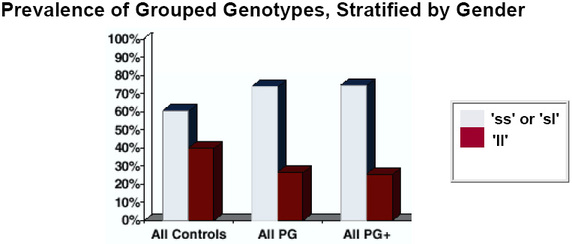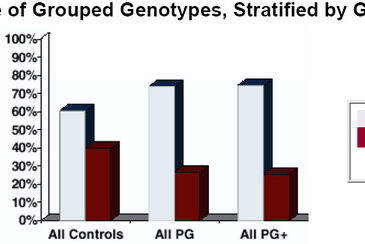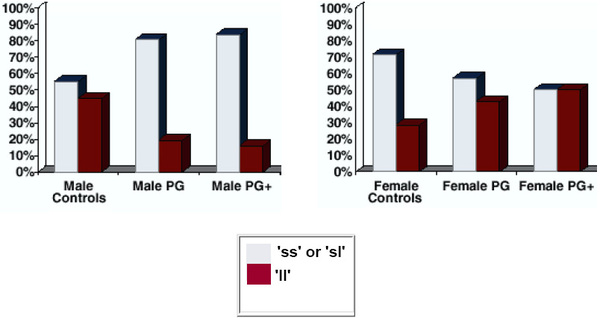Nested among the over 27 million bases of human chromosome 17 lies the 5-HTT gene, which regulates a critical function in the brain. It is this gene that controls the expression of the transporters responsible for the uptake of serotonin after its release into the synaptic gap that separates one neuron from its neighbor.
A brief review of the events that are responsible for the chemical transmission of nervous impulses is as follows: 1) Electrical signals travel down the length of a neuron, eventually reaching the the terminal of the presynaptic cell 2) The impulse triggers the release of serotonin (or any other neurotransmitter) into the synapse that separates the presynaptic neuron from its postsynaptic neighbor 3) The release of neurotransmitters produces an electrical impulse in the postsynaptic cell 4) Serotonin transporters help the presynaptic cell reabsorb the serotonin that is now “loose” in the synapse. Dysfunction of the serotonin uptake function has been implicated in numerous psychopathologies. It is this problem that SSRIs (Selective Serotonin Reuptake Inhibitors) such as Prozac and Zoloft attempt to rectify.
Lesch et al. (1996)1 identified two important variations in the DNA that makes up the 5-HTT. These variations are generally referred to as the ‘long allele’ (‘l’) and the ‘short allele’ (‘s’). Lesch also noted that individuals who are homozygous for the ‘l’ allele (i.e., ‘ll’) generally have serotonin uptake that is more efficient than individiduals with one or more of the ‘s’ allele (i.e., ‘sl’ or ‘ss’). Thus, if genetic variations are associated with differential efficiencies of uptake, and uptake efficiency is associated with psychopathology, then by syllogism we might expect these variations to be a determining factor in psychopathology. It is this proposition that Perez de Castro et al. (1999)2 set out to investigate using the psychopathology of compulsive gambling. Preliminary results from this research were mentioned in a previous WAGER.
Using an experimental group of 68 pathological gamblers and 68 matched controls, the authors recorded the genetic configuration (genotype) of each subject. For the present analysis, subjects with the ‘ll’ genotype were separated from subjects with the ‘ls’ and ‘ss’ genotype. In addition, pathological gamblers were sorted into two groups (PG and PG+) according to the severity of their illness. The results of this analysis are presented below.

Only two statistically significant relationships were found. Male pathological gamblers were more likely than male controls to have the ‘ss’ or ‘sl’ genotype (p<.01). The relationship was similar for the subgroup of more severe pathological gamblers (p<.01). Thus, among men, there is an association between having the short allele and being a pathological gambler. It should be noted that this does not imply a causal relationship, and knowledge of both genetics and functional neurochemistry is still limited. With only 12% of the human genome mapped,3 it is likely that our understanding of the genetics of pathological gambling will extend far beyond a lone gene nestled among the DNA helices of human chromosome 17.
Sources: 1Lesch, K.P., Bengel, D., Heils, A., Sabol, S.Z., Greenberg, B.D., Petri, S., Benjamin, J., Muller, C.R., Hamer, D.H. & Murphy, D.L. (1996). Association of anxiety-related traits with a polymorphism in the serotonin transporter gene regulatory region. Science, 274, 1527-1531. 2Perez de Castro, I., Ibanez, A., Saiz-Ruiz, J., & Fernandez-Piqueras, J. (1999). Genetic contribution to pathological gambling: Possible association between a functional DNA polymorphism at the serotonin transporter gene (5-HTT) and affected men. Pharmacogenetics, 9, 397-400. 3Human Genome Project. (1999) Human Genome News, 10 (3-4).
The WAGER is funded, in part, by the National Center for Responsible Gaming, the Massachusetts Department of Public Health, the Andrews Foundation, the Addiction Technology Transfer Center of New England, the Substance Abuse and Mental Health Administration Services, and the Center for Substance Abuse Treatment.






Samuel Kazungu Muramba June 29, 2017
Thanks intended for giving this type of substantial post.